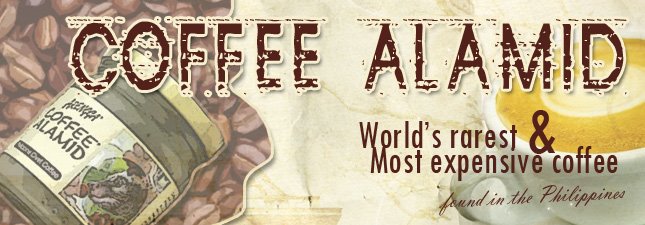The Paradoxorus Philippinensis is a civet which belongs to the mongoose family- a nocturnal animal which uses its nose to choose the ripest and sweetest coffee cherries and relentlessly eats them during coffee season.
Coffee Alamid is a blend of the Philippine's finest Arabica, Liberica and Exelsa beans.
When roasted, it exudes an almost musical, fruity aroma.
It has a strong, sweet, dark chocolatey taste that is perfect for that morning kick or high power meetings. Definitely a clean cup.
Coffee Alamid
-Supports the protection of the civets
-Preserves the civets' habitat & the environment
-Provides livelihood for the forest dwellers

Reference:
BBC News, April 11, 2006 “The Philippines’ taste for civet coffee”
USA Today, Jan 20, 2004 “Civet coffee: good to the last dropping”
Discovery Channel “Planet G”:
MBC Documentary Production Team: Shooting during Jan 23 – 28. Mt. Malayat, Batangas.
Alamid - nocturnal civet that uses its sense of smell to choose only the sweetest and ripest coffee berries.
Alamid likes lush forests and clean rivers with lots of fruits.
When they lose their habitat, they go down the forests and eat baby chickens.
They are considered pests & are eaten.


FAIR TRADE
What is Fair Trade?
The most widely recognized definition of fair trade was created by FINE, an informal Association of the four main fair trade networks (Fairtrade Labeling Organizations International, International Fair Trade Association, Network of European Worldshops and European Fair Trade Association).
Fair trade is a trading partnership, based on dialogue, transparency and respect, which seeks greater equity in international trade. It contributes to sustainable development by offering better trading conditions to, and securing the rights of, marginalized producers and workers - especially in the South. Fair trade organizations (backed by consumers) are engaged actively in supporting producers, awareness raising and in campaigning for changes in the rules and practice of conventional international trade.






